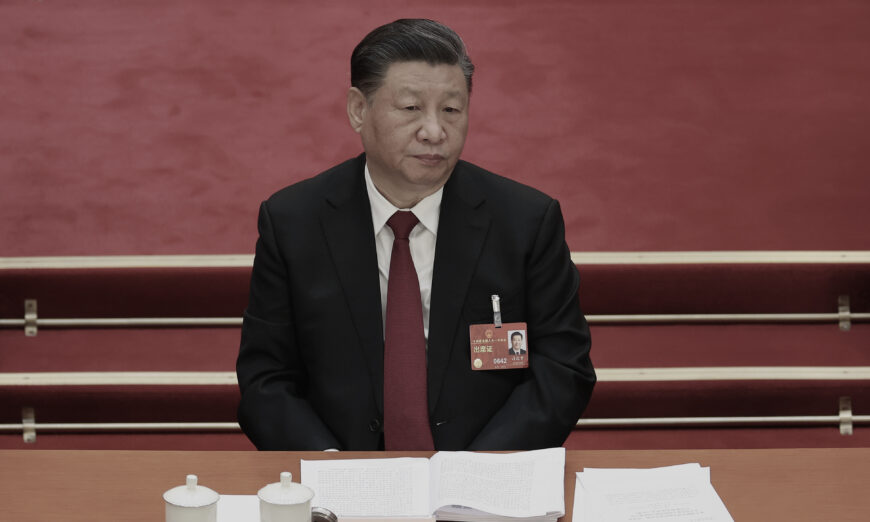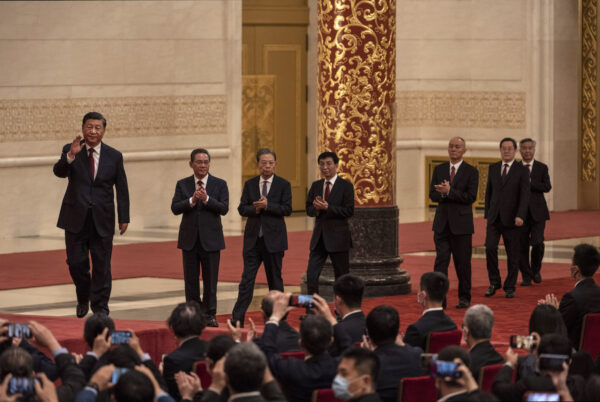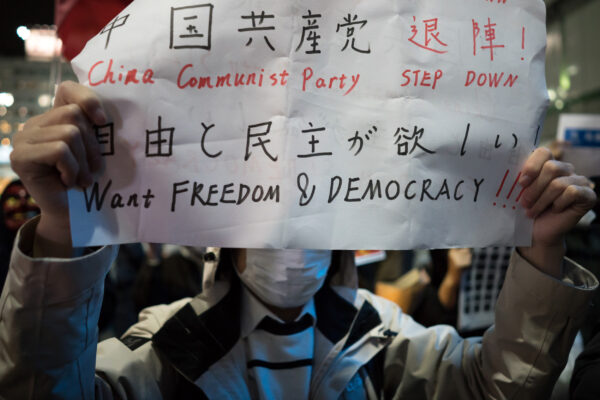China Sets Up Mechanism to Monitor Its Spies Amid Domestic and International Turmoils
Chinese Ministry of State Security, the regime’s intelligence apparatus, is under more stringent supervision, while the communist regime fears loss of control of its ever-present secret agents. The regime’s spy chief published a commentary in early June, demanding loyalty to the CCP and prioritizing the monitoring of China’s spies by setting up a new monitoring team in the state security system. Chen Yixin, the current state-security czar, was appointed as minister of state security in October last year. Chen is regarded as a confidant of the regime’s top leader Xi Jinping. In an article published on June 5, Chen emphasized a “focus on overcoming the unique difficulties of strengthening supervision on the underground front” and the establishment of inspection and supervision groups for “regular inspection and supervision” of the leading officials in the state security system. “Disloyalty” is the first among the five issues that Chen wants to “rectify,” as revealed in his article. China experts view this as a sign of a new purging campaign by the CCP. “[Political] purging is a standard norm of authoritarian regimes,” said Feng Chongyi, associate professor of China studies at the University of Technology Sydney. He added that the CCP’s top leader Xi Jinping has been cracking down on his potential political opponents from inside the regime. The police, the state security, and the legal and judiciary system have been under the control of Xi’s major rival Jiang Zemin faction and are the major targets of Xi’s purging. Intelligence Online, a France-based intelligence publication, wrote last November that Xi expected Chen to “eliminate corruption—and any sign of opposition—in the police, the army, and the intelligence services.” The Ministry of State Security was set up in 1983, not for domestic spying at the time, but for the purpose of collecting foreign intelligence, counterintelligence, and political security. Fearing the loss of control domestically, Xi has appointed a confidant to control the system for him and has expanded the system into almost every field of Chinese society. Chinese Communist Party leader Xi Jinping (left) walks with members of the new Standing Committee of the Party’s Political Bureau, (from 2nd left) Li Qiang, Zhao Leji, Wang Huning, Can Qi, Ding Xuexiang, and Li Xi as they arrive for a group photo with journalists at The Great Hall of the People in Beijing, China, on October 23, 2022. (Kevin Frayer/Getty Images) Xi Faces Major Crisis From Within and Outside: China Experts Prof. Feng said that Xi is aware of the illegitimacy of the CCP and the severe faction fighting within the party on top of the poor Chinese economy. The Chinese media has been warning “two-faced persons” who are disloyal to the CCP and its top leader, and Xi has been extra vigilant of any possible attempt to overturn either him or the CCP, according to Feng. “Xi wants to consolidate his power. After he has annihilated his opponents on the periphery, he is now cleaning up enemies close to him,” Feng said in an interview with the Chinese language edition of The Epoch Times on June 6. “The [history of the] communist regime is [one of] constant purging, and every moment [in its history] is a struggle of life and death.” Xi has been on guard against any potential threat from within the CCP. He set up the CCP’s National Security Commission in November 2013 and has personally chaired the commission. In the following year, he put forward the concept of “comprehensive state security,” with security permeating into almost all fields in China. In Xi’s tenure, security now covers political security, territorial security, military security, economic security, social security, and cybersecurity, among many other types of security. Xi turned national security into a tool to control all aspects of China’s governance. At the same time, Xi weeded out his major political rivals, including those in the state security and police systems, such as Ma Jian, Zhou Yongkang, Sun Lijun, and Fu Zhenghua. From 2012 to 2022, Xi used the CCP’s disciplinary watchdog to get rid of nearly five million party officials in the name of anti-graft. The inherent infighting is not the only concern that Xi has. Wang Youqun, a former aide and copywriter for Wei Jianxing, the CCP’s former anti-corruption tsar, noted that Xi has to deal with deteriorating domestic and overseas perils. Protesters take part in a rally commemorating victims of China’s zero-COVID policy outside Shinjuku Station in Tokyo, Japan, on Nov. 30, 2022. (Tomohiro Ohsumi/Getty Images) In the three years of pandemic hard lockdowns, protests broke out across the country, leading to the White Paper Movement that broke out in November 2022, with young people demanding that Xi and the CCP step down. This was the first time during the CCP’s decades of rule that Chinese people cried out such a demand on China’s soil. Since then, “CCP, Step Down!” can be heard throughou

Chinese Ministry of State Security, the regime’s intelligence apparatus, is under more stringent supervision, while the communist regime fears loss of control of its ever-present secret agents.
The regime’s spy chief published a commentary in early June, demanding loyalty to the CCP and prioritizing the monitoring of China’s spies by setting up a new monitoring team in the state security system.
Chen Yixin, the current state-security czar, was appointed as minister of state security in October last year. Chen is regarded as a confidant of the regime’s top leader Xi Jinping.
In an article published on June 5, Chen emphasized a “focus on overcoming the unique difficulties of strengthening supervision on the underground front” and the establishment of inspection and supervision groups for “regular inspection and supervision” of the leading officials in the state security system. “Disloyalty” is the first among the five issues that Chen wants to “rectify,” as revealed in his article.
China experts view this as a sign of a new purging campaign by the CCP.
“[Political] purging is a standard norm of authoritarian regimes,” said Feng Chongyi, associate professor of China studies at the University of Technology Sydney. He added that the CCP’s top leader Xi Jinping has been cracking down on his potential political opponents from inside the regime.
The police, the state security, and the legal and judiciary system have been under the control of Xi’s major rival Jiang Zemin faction and are the major targets of Xi’s purging.
Intelligence Online, a France-based intelligence publication, wrote last November that Xi expected Chen to “eliminate corruption—and any sign of opposition—in the police, the army, and the intelligence services.”
The Ministry of State Security was set up in 1983, not for domestic spying at the time, but for the purpose of collecting foreign intelligence, counterintelligence, and political security. Fearing the loss of control domestically, Xi has appointed a confidant to control the system for him and has expanded the system into almost every field of Chinese society.

Xi Faces Major Crisis From Within and Outside: China Experts
Prof. Feng said that Xi is aware of the illegitimacy of the CCP and the severe faction fighting within the party on top of the poor Chinese economy. The Chinese media has been warning “two-faced persons” who are disloyal to the CCP and its top leader, and Xi has been extra vigilant of any possible attempt to overturn either him or the CCP, according to Feng.
“Xi wants to consolidate his power. After he has annihilated his opponents on the periphery, he is now cleaning up enemies close to him,” Feng said in an interview with the Chinese language edition of The Epoch Times on June 6.
“The [history of the] communist regime is [one of] constant purging, and every moment [in its history] is a struggle of life and death.”
Xi has been on guard against any potential threat from within the CCP. He set up the CCP’s National Security Commission in November 2013 and has personally chaired the commission. In the following year, he put forward the concept of “comprehensive state security,” with security permeating into almost all fields in China. In Xi’s tenure, security now covers political security, territorial security, military security, economic security, social security, and cybersecurity, among many other types of security. Xi turned national security into a tool to control all aspects of China’s governance.
At the same time, Xi weeded out his major political rivals, including those in the state security and police systems, such as Ma Jian, Zhou Yongkang, Sun Lijun, and Fu Zhenghua.
From 2012 to 2022, Xi used the CCP’s disciplinary watchdog to get rid of nearly five million party officials in the name of anti-graft.
The inherent infighting is not the only concern that Xi has.
Wang Youqun, a former aide and copywriter for Wei Jianxing, the CCP’s former anti-corruption tsar, noted that Xi has to deal with deteriorating domestic and overseas perils.

In the three years of pandemic hard lockdowns, protests broke out across the country, leading to the White Paper Movement that broke out in November 2022, with young people demanding that Xi and the CCP step down. This was the first time during the CCP’s decades of rule that Chinese people cried out such a demand on China’s soil. Since then, “CCP, Step Down!” can be heard throughout China.
Wang also said that the Chinese economy has been declining since the outbreak of the pandemic, with a high unemployment rate, an aging population, and a nose-diving birth rate. The Chinese society is in unrest.
Overseas, Wang added, the CCP’s spy balloons and overseas police stations have messed up its diplomatic relations with major democracies in the world, including the United States. and European Union member states. The CCP’s increasing military coercion in the Taiwan Strait and the South China Sea have forced Asian countries to stand close to the United States to fight against the CCP’s meddling in the surrounding regions.
On May 30, at a meeting of CCP’s National Security Commission, Xi said that national security is facing a “complex and critical situation.” He stressed the need “to adhere to bottom-line thinking and worst-case-scenario thinking” and “to prepare to withstand major tests of high winds and rough waves, and even perilous, stormy seas.”
“After the CCP’s 20th National Congress, although the ‘Xi family army [Xi’s loyalties]’ has come into full power, the security situation facing Xi has deteriorated rather than improved,” Wang wrote in a commentary for the Chinese language edition of The Epoch Times on June 6.
Xi and his protégés are now the seven members of the CCP’s Politburo, the top decision-making body in China.
“Xi has realized that he is facing a major, profound, and comprehensive internal and external crisis and that there may be a perilous wave waiting for him,” wrote Wang, adding that strengthening the CCP’s security forces and loyalty isn’t the way out for Xi.
Ning Haizhong and Luo Ya contributed to this report.












